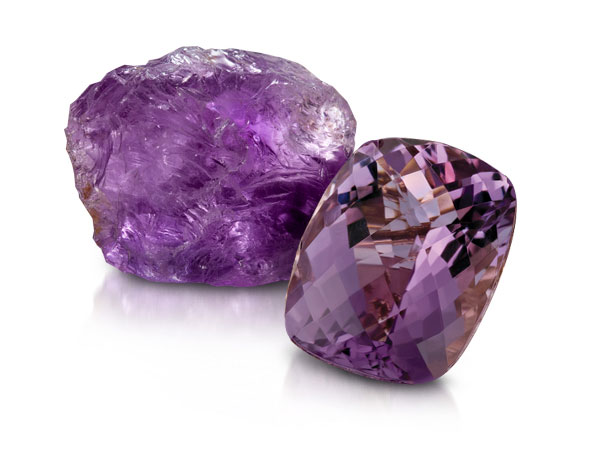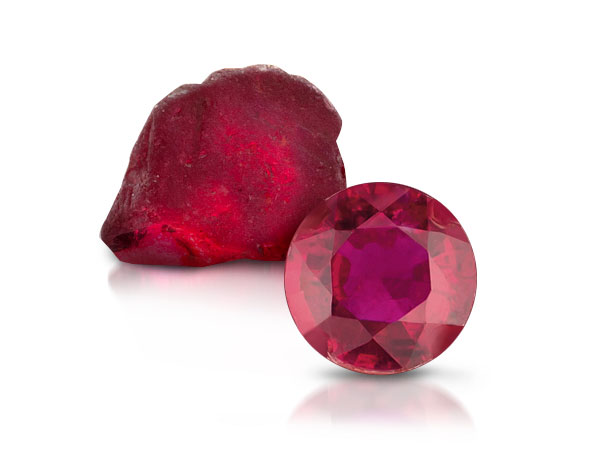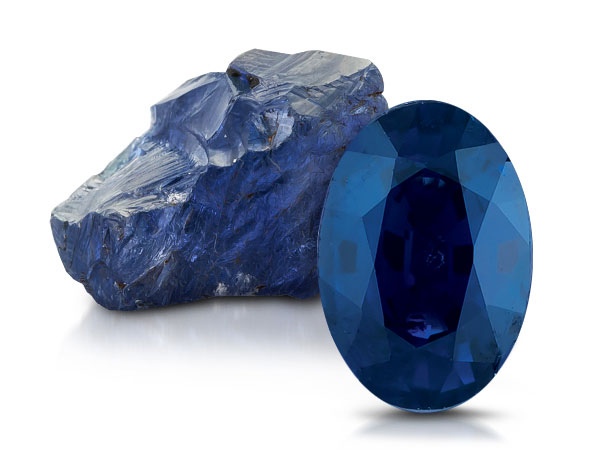Grape Amethyst™
Amethyst is one of the most popular and mystical gemstones: worn by the ancient Romans as a talisman; written about by Leonardo da Vinci who said the gem had the power to protect against evil thoughts and sharpen intelligence; and to this day, amethysts are featured in the Tibetan rosary as the Buddhists believe the gem enhances the peace and tranquility of meditation.
Amethysts come in a variety of shades and colors, from pink to the deepest royal purple which is the sweet flavor of Le Vian®'s Candy Colors® Amethyst. Brazil and Zambia are the major producers of gem quality amethyst.
Very large sizes of rich, deep color amethyst are very rare. An amethyst which weighs more than 1,000 carats can be seen The Smithsonian Institution, whose gem gallery is home to some of the most famous Amethyst gems in the world dating back to the early 1900's. Other famous amethysts housed at The Smithsonian include: the 96-carat heart-shaped Morris Amethyst brooch; a 56-carat square, cushion-cut amethyst necklace that displays a deep purple color with flashes of red.

CINNAMON CITRINE®
The name citrine comes from the French word "Citron" meaning lemon, its color ranging from a juicy lemon yellow to orange brownish orange. This popular neutral gem is the most affordable of the earth-toned gemstones and pairs perfectly with Le Vian® Honey GoldTM.
In ancient times, citrine was worn to deter from snakebites and the even more powerful venom of evil words and thoughts. This gem garnered a big following in the 40s in retro jewelry, with its sun kissed color and large stones brilliantly set against the bold gold of the era. Joan Crawford was often seen wearing an emerald-cut citrine ring that was more than 100 carats!
Bubble Gum Pink SapphiresTM
Corundum Family | Mohs Scale: 9
Throughout history, sapphires have always been associated with the color blue, perhaps most likely due to its name which comes from the Greek word sappheiros (blue stone). Traditionally, sapphire symbolizes truth, sincerity, and faithfulness. In history, clergy members wore the gem to symbolize Heaven. In ancient Greece and Rome, the royals believed sapphires protected them from envy and harm. Sapphires have also been closely associated with romance and the royals, most recently in modern times. In 1981, Prince Charles gave Lady Diana Spencer a blue sapphire engagement ring. The same ring was later given to Kate Middleton by Princess William.
But all sapphires are not blue and, in fact, come in a rainbow of colors including pink, which Le Vian® has chosen for its strawberry pink flavor.
PASSION RUBYTM
Ruby has the distinction of being the most valued gemstone throughout most of recorded history. Ancient Sanskrit referred to the ruby as the "king of precious stones", the bible found only wise and virtuous women more precious than rubies and the Persian sage al-Biruni wrote about rubies the first place in color, beauty and rank among all gems. The name Ruby comes from the Latin word ruber for its hue. The strength of red in the ruby depends on how much chromium is present—the more chromium, the stronger the red color. Chromium can also cause fluorescence, which adds to the intensity of the red color. The brilliant crimson color of this gem is associated with passion and love, making the ruby an ideal choice for engagement rings.
There are many famous rubies throughout history, two of which can be seen at the Smithsonian Institution, National Museum of Natural History including the 138.72-carat Rosser Reeves Star Ruby from Sri Lanka and the 23.10-carat Carmen Lucia Ruby which is considered one of the world's finest large Burmese rubies.

BLUEBERRY SAPPHIRETM
Throughout history, sapphires have always been associated with the color blue, perhaps most likely due to their name, which comes from the Greek word sappheiros (blue stone). Traditionally, sapphire symbolizes truth, sincerity, and faithfulness. In history, clergy members wore the gem to symbolize Heaven. In ancient Greece and Rome, the royals believed sapphires protected them from envy and harm. Sapphires have also been closely associated with romance and the royals, most recently in modern times. In 1981, Prince Charles gave Lady Diana Spencer a blue sapphire engagement ring. The same ring was later given to Kate Middleton by Prince William
But all sapphires are not blue and, in fact, come in a rainbow of colors including varying shades of blue as well as “fancy sapphires” in pink, yellow, orange, lavender, purple. Blues can be pure blue but may have a range from greenish blue to violet blue. The blue in a sapphire is the result of trace elements of iron and titanium; the more iron in the sapphire, the darker the blue.

FOREST GREEN TSAVORITETM
Tsavorite is a green garnet and, like other garnets, forms
within metamorphic rocks; its rareness comes from its specific
need for more unusual rock chemistries and special conditions to
be in place in order for it to form.
The color scale of this gem is fresh and
invigorating, ranging from a spring-like pale green to an
intensely bluish-green to a deep forest green, which is the
flavor of Le Viang Forest Green TsavoriteTM.
BLACKBERRY DIAMONDS®
Blackberry Diamonds® add a touch of chic drama to fine jewelry by providing a touch of mysterious sparkle with day into evening fashion forward looks. The lore of this midnight flavored diamond includes Italians, who, in medieval times, believed that black diamonds helped married couples revive their relationships. The “Black Orlov” diamond, the most famous black diamond, was reputed to give happiness and good fortune to anyone who touched it. Other famous black diamonds include “Sergio,” the largest diamond ever found, discovered in Brazil and weighing over three thousand carats!
Le Vian Exotics® offer many unique designs featuring Blackberry Diamonds® like Black Tie looks which pair with Vanilla Diamonds® and Vanilla Gold® for crisp contrast and Chocolate Covered Blackberry™ combining the warm sweet flavors of Strawberry Gold® and Chocolate Diamonds®.



























































